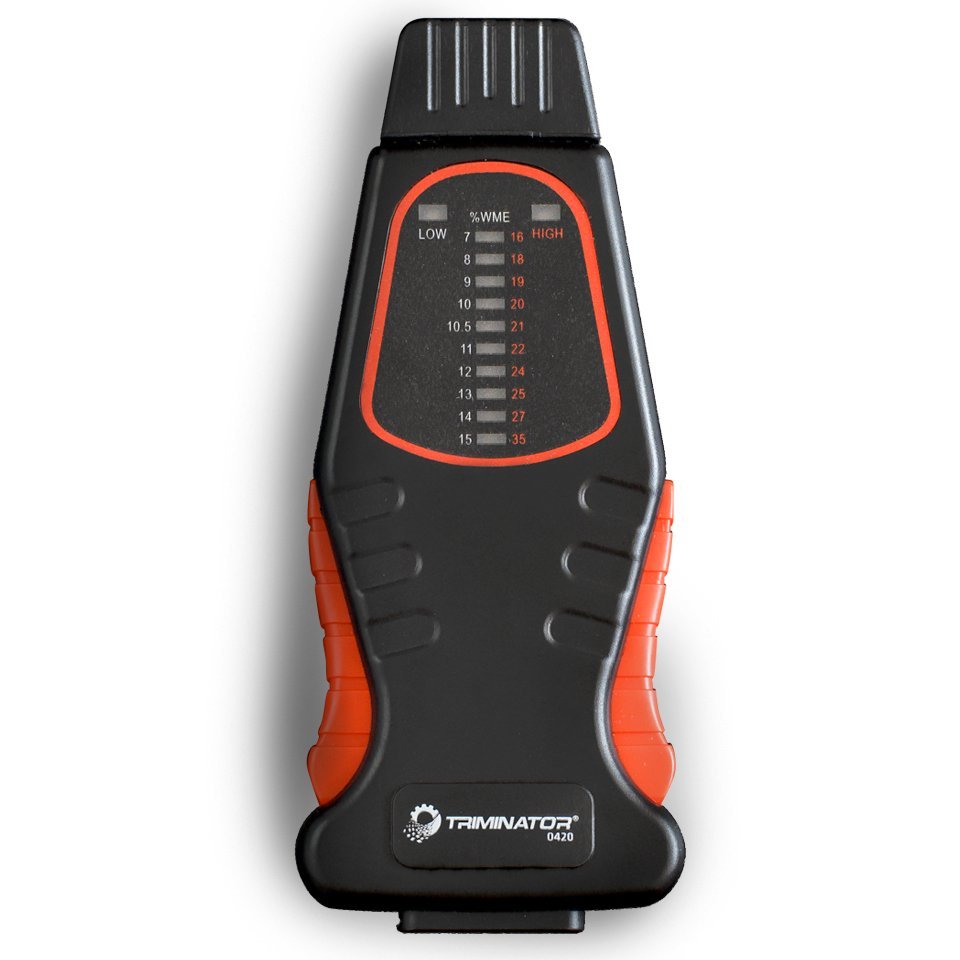The Ultimate Overview to Dampness Meters: A Comprehensive Summary and How They Can Save You Cash
Moisture meters serve as essential devices in discovering and keeping track of moisture material in products, aiding in stopping pricey damages and making sure the quality of products. Recognizing the subtleties of different types of dampness meters, their applications, and the potential cost-saving advantages they offer can be a game-changer for specialists and businesses alike.
Kinds of Moisture Meters
Numerous kinds of moisture meters are readily available for different applications in various markets. One usual type is the pin-type wetness meter, which determines the electric resistance between 2 pins inserted right into a product. This type is suitable for wood, drywall, and various other building materials. Pinless wetness meters, on the various other hand, usage electromagnetic sensor plates to scan a larger area without creating damages to the product's surface. Moisture Meter. These meters are ideal for rapidly assessing dampness levels in large locations such as floorings and walls.

Additionally, there are additionally specialty wetness meters developed for particular products like grain, dirt, or hay. These meters supply precise moisture analyses tailored to the unique residential properties of the material being examined. Infrared wetness meters measure the thermal properties of a product to determine its dampness material non-invasively, making them useful for applications where pin or pinless meters might not appropriate. Recognizing the different kinds of wetness meters available can aid markets pick the most ideal device for their particular dampness measurement needs.

Benefits of Utilizing Wetness Meters
Dampness meters use vital benefits in properly evaluating and keeping track of dampness levels in varied materials and environments (Moisture Meter). One of the primary benefits of using wetness meters is the avoidance of possible damage triggered by excess wetness. By detecting and dealing with high wetness levels at an early stage, dampness meters aid to stop mold and mildew development, rot, and structural damage in structures, conserving both time and money on repair services. In addition, moisture meters aid in making sure the quality of materials throughout building or production processes. By accurately measuring wetness web content, these tools assist maintain the stability of wood, drywall, concrete, and various other products, minimizing the risk of problems or failings.
Additionally, utilizing wetness meters can lead to enhanced energy effectiveness. In agricultural setups, dampness meters play a vital role in maximizing crop returns by enabling farmers to keep an eye on soil wetness levels and make notified irrigation choices.
How to Select the Right Moisture Meter
Selecting the suitable moisture meter includes considering vital elements such as product compatibility, measurement range, and calibration precision. When choosing a dampness meter, it's important to guarantee that the meter is appropriate for the details material you will be screening. Various materials have varying electric residential or commercial properties that can affect dampness readings, so picking a meter developed for your product is important for precise outcomes. In addition, consider the measurement variety of the moisture meter. Make sure that the meter can identify dampness levels within the range required for your applications. Calibration accuracy is another crucial element to keep in mind. Select a moisture meter with reliable calibration to ensure consistent and exact analyses. Some meters may call for periodic calibration adjustments, so understanding the calibration procedure is essential. By carefully examining these factors, you can select a dampness meter that meets your requirements and provides exact dampness dimensions for your tasks.
Correct Strategies for Dampness Meter Usage

Expense Financial Savings Through Moisture Meter Applications
Just how can the strategic utilization of wetness meters lead to considerable expense financial savings across various markets? In the agriculture industry, moisture meters aid in find here figuring out the ideal time for harvesting crops, stopping over-drying or excess moisture that can affect the final product's quality.
In a similar way, in building and construction, moisture meters assist prevent expensive damages by finding moisture degrees in structure materials, such as timber or concrete, which can lead to architectural concerns if not resolved quickly. By recognizing problem locations early on, specialists can take corrective procedures to avoid considerable repair work or substitutes, inevitably saving money and time.
Additionally, in the food handling industry, dampness meters are important for checking product quality and making certain compliance with safety guidelines. By accurately determining moisture material in foodstuff, suppliers can prevent putridity, keep freshness, and decrease waste, resulting in considerable expense financial savings. Overall, the tactical application check this site out of wetness meters is a useful financial investment that can lead to substantial expense reductions and boosted efficiency across different sectors.
Conclusion
Finally, dampness meters are important tools for measuring and discovering dampness degrees in various materials. By using the right moisture meter and following proper methods, users can effectively protect against pricey problems triggered by excess moisture. Investing in a quality moisture meter can lead to significant price financial savings in the lengthy run by recognizing prospective problems early on and enabling punctual removal. Eventually, dampness meters are essential tools for maintaining the honesty and long life of frameworks and products.
Dampness meters serve as crucial tools in identifying and keeping an eye on moisture web content in materials, helping in preventing expensive problems and ensuring the high quality of items. Infrared moisture meters determine the thermal residential properties of a product to identify its dampness content non-invasively, making them helpful for applications where pin or pinless meters might not be ideal.Moisture meters use invaluable advantages in precisely assessing see here now and keeping track of dampness levels in diverse products and environments. In agricultural settings, wetness meters play a crucial function in enhancing plant yields by allowing farmers to monitor dirt moisture levels and make educated irrigation decisions.In verdict, moisture meters are important devices for gauging and spotting wetness degrees in numerous materials.